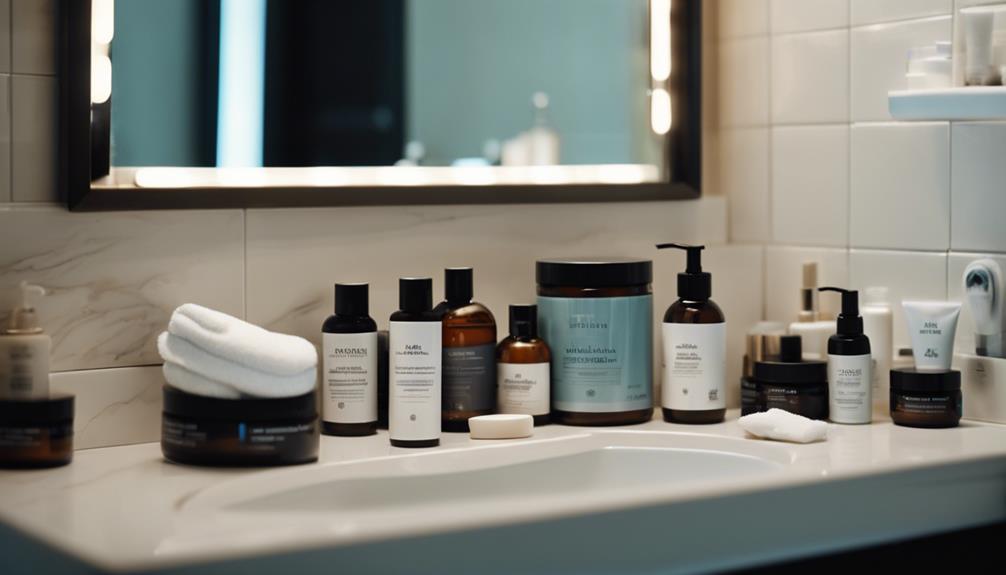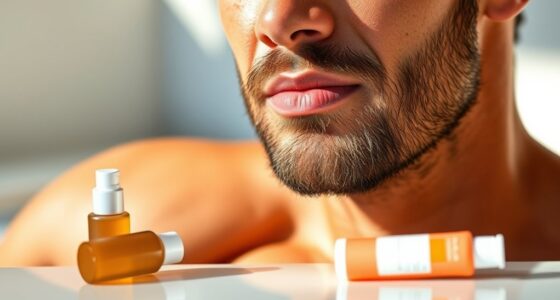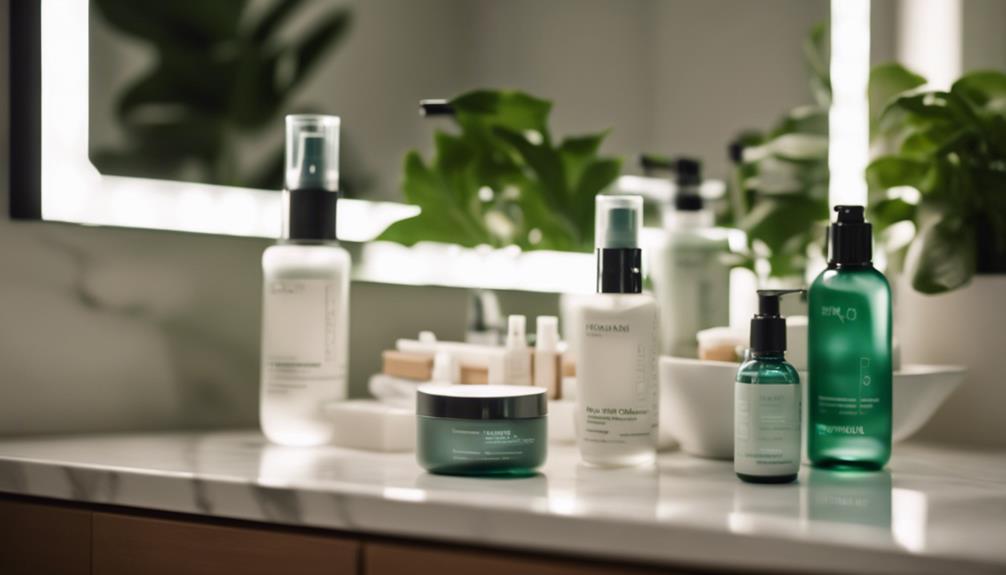You need to start using sunscreen today because it protects your skin from harmful UV radiation, greatly reducing your risk of skin cancer. With 1 in 5 Americans facing a skin cancer diagnosis by age 70, you can't afford to skip this essential step. Even on cloudy days, up to 80% of UV rays can reach you, so daily application of a broad-spectrum sunscreen with at least SPF 30 is vital. It also helps prevent premature aging, keeping your skin looking youthful. If you want to know how to choose the right sunscreen and apply it correctly, there's a lot more to explore.
Key Takeaways
- Daily sunscreen use protects your skin from harmful UV radiation, reducing the risk of skin cancer significantly.
- Even on cloudy days, up to 80% of UV rays can penetrate, making sunscreen essential year-round.
- Regular application helps prevent premature aging signs, such as wrinkles and discoloration, keeping skin youthful.
- Broad-spectrum sunscreen with at least SPF 30 is necessary to shield against both UVA and UVB rays effectively.
Importance of Daily Sunscreen
Using sunscreen daily is essential for protecting your skin from harmful UV radiation and reducing your risk of skin cancer. Statistics show that 1 in 5 Americans will develop skin cancer by age 70, making it vital to apply sunscreen every day.
Even on cloudy days, up to 80% of UV rays can reach your skin, so don't skip this step, regardless of the weather.
Daily sunscreen not only shields you from UV rays but also helps prevent skin aging. Consistent use reduces signs of premature aging like wrinkles, fine lines, and discoloration.
For effective protection, look for a broad-spectrum sunscreen with at least SPF 30, especially if you plan to spend time outdoors. Higher SPF values offer greater safety, ensuring you're well-protected from harmful UVB rays.
Choosing the Right SPF

When selecting sunscreen, consider opting for a product with at least SPF 30 to guarantee adequate protection against harmful UVB rays. SPF 30 filters out about 97% of UVB rays, while SPF 15 only blocks approximately 93%. This difference shows how vital it's to choose a higher SPF for better skin health. If you plan on spending extended time outdoors, aim for SPF 60 or higher, as most people don't apply enough sunscreen to achieve the labeled SPF protection.
Don't forget to look for broad-spectrum formulas. These protect against both UVA and UVB rays, ensuring extensive coverage against skin damage. Incorporating sunscreen into your daily routine is essential, even on cloudy days, as harmful rays can penetrate through clouds.
To maintain effective protection, remember that reapplication is key. Apply your sunscreen every two hours, especially if you're swimming or sweating. Consistent use of the right SPF will greatly reduce your risk of skin damage over time and enhance your overall skin health.
Make sunscreen a non-negotiable part of your day, and you'll be investing in your skin's future.
Application Techniques and Amounts

Applying the right amount of sunscreen is vital for effective protection against harmful UV rays. To achieve full body coverage, you should apply about 1 ounce, which is roughly the size of a shot glass. For your face and neck, a half teaspoon is recommended to make sure these areas are well protected.
Proper application techniques matter greatly. Make sure your sunscreen is evenly applied; rub it in thoroughly so that every exposed area is covered. This helps maximize your protection factor against UV rays. Using a broad-spectrum sunscreen is also important, as it guards against both UVA and UVB rays.
Don't forget to reapply sunscreen every two hours, or immediately after swimming or sweating. This helps maintain effective protection throughout your outdoor activities. To guarantee accurate application amounts, consider using a measuring tool or specific containers designed for sunscreen.
Sunscreen Myths Debunked

Many misconceptions surround sunscreen, leading people to underestimate its importance and effectiveness in protecting skin from UV damage.
For instance, many think sunscreen use is only necessary on sunny days, but up to 80% of UV rays can still penetrate clouds. That's why you should apply sunscreen daily, regardless of the weather.
Another myth is that higher SPF means considerably better protection. In reality, SPF 30 blocks about 97% of UVB rays, while SPF 15 only blocks around 93%. Regular reapplication is key!
Some believe that darker skin types don't need sunscreen, but skin cancer can affect anyone. Consistent sunscreen use is essential for reducing the risk of melanoma and other skin cancers.
Additionally, while water-resistant sunscreens are effective, they only last for 40 to 80 minutes in water, so you need to reapply frequently after swimming or sweating.
Finally, relying solely on makeup with SPF isn't enough; most products don't provide the necessary coverage or consistent application to match the protection of standalone sunscreen.
Sunscreen for All Skin Types

No matter your skin type, sunscreen is a must to protect against UV damage.
You need to choose the right formula that caters to your specific needs, whether you have sensitive skin or a deeper complexion.
With the right sunscreen, you can keep your skin healthy and glowing all year round.
Essential for All Complexions
Sunscreen is essential for everyone, as UV damage doesn't discriminate based on skin type or tone. Regardless of your complexion, you're at risk for skin cancer, with 1 in 5 Americans developing it by age 70. That's why daily application of a broad-spectrum sunscreen with at least SPF 30 is critical. This protects against both UVA and UVB rays, which can lead to skin cancer and premature aging.
Even if you have darker skin, you're not immune to the harmful effects of UV rays. Many believe they've natural protection, but that misconception can lead to serious consequences. Regular use of sunscreen can help prevent discoloration, inflammation, and sun spots that affect all skin types.
Moreover, daily sunscreen use is imperative for maintaining overall skin health, especially if you're managing conditions like rosacea or acne. It's an easy step you can take to protect your skin.
Don't forget to pair your sunscreen with protective clothing for added defense. Make sunscreen a non-negotiable part of your routine, and you'll thank yourself for it in the long run.
Tailoring Formulas to Needs
Choosing the right sunscreen for your skin type can greatly enhance protection and comfort during sun exposure. Here's a quick guide to help you select the best formula:
| Skin Type | Recommended Sunscreen | Key Ingredients |
|---|---|---|
| Oily Skin | Oil-free formulations | Gel-based, Non-comedogenic |
| Sensitive Skin | Mineral-based sunscreens | Zinc oxide, Titanium dioxide |
| Acne-Prone Skin | Non-comedogenic | Water-based, Gel-based |
For sensitive skin, mineral-based sunscreens containing zinc oxide are often the best choice, as they provide physical protection without causing irritation. If you have acne-prone skin, opt for non-comedogenic options that won't clog your pores.
For those with specific skin conditions like rosacea or eczema, it's vital to consult a dermatologist for personalized sunscreen recommendations tailored to your needs. If you have darker skin tones, consider invisible or tinted sunscreens to avoid the white cast that often comes with traditional formulations while still ensuring effective UV protection. Tailoring your sunscreen to your specific skin type is essential for ideal comfort and effectiveness.
Long-term Benefits of Sunscreen

Regularly applying sunscreen offers invaluable protection against skin cancer and premature aging, ensuring your skin remains healthy and resilient over time. The long-term benefits of daily use are significant and can greatly enhance your skin's appearance.
Here are three essential advantages of using sunscreen:
- Reduced Skin Cancer Risk: Consistent application lowers your chances of developing skin cancer, with 1 in 5 Americans facing a diagnosis by age 70. Protect yourself by incorporating broad-spectrum sunscreen into your routine.
- Prevention of Signs of Aging: Regular sunscreen use can prevent wrinkles and age spots, helping you maintain a youthful complexion. Studies show that daily use directly improves skin appearance.
- Enhanced Skin Health: Sunscreen helps reduce inflammation and discoloration while supporting your skin's natural barrier against environmental stressors. Using a minimum SPF of 30 can filter about 97% of UVB rays, providing essential defense against sun damage.
Frequently Asked Questions
What Age Should You Start Wearing Sunscreen Every Day?
You should start wearing sunscreen every day as early as six months old. Establishing this habit now helps protect your skin from harmful UV rays, reducing the risk of skin cancer and premature aging later in life.
What Happens to Your Skin When You Start Using Sunscreen?
Sunscreen shields your skin, starting a stunning transformation. You'll see smoother texture, diminished discoloration, and reduced risks of wrinkles. Consistent application cultivates a healthier complexion and enhances your skin's natural defenses against harmful UV rays.
What Happens if You Don't Wear Sunscreen Every Day?
If you don't wear sunscreen every day, you risk sunburn, skin damage, and premature aging. Your skin can develop discoloration, inflammation, and painful redness, making it more susceptible to conditions like rosacea and acne.
Why Do You Have to Put Sunscreen on Early?
Imagine you're at the beach, and you forget sunscreen. UV rays hit within minutes, risking your skin. You have to put sunscreen on early because it needs time to absorb and offer maximum protection from harmful rays.
Is Motor Oil a Safe Alternative to Sunscreen?
Motor oil should never be used as the ultimate man’s sun protection. It does not offer any protection from UV rays and can actually clog pores and cause skin irritation. Using motor oil instead of sunscreen can lead to serious sunburn and long-term skin damage. Always use proper sunscreen for sun protection.
Conclusion
Incorporating sunscreen into your daily routine is as essential as brushing your teeth.
By protecting your skin from harmful UV rays, you're investing in your future health and appearance.
Don't let myths hold you back—everyone can benefit from a good sunscreen, regardless of skin type.
Remember, the long-term advantages far outweigh any minor inconveniences.
So, start today, and give your skin the care it deserves; it's a small step that leads to a lifetime of rewards.









